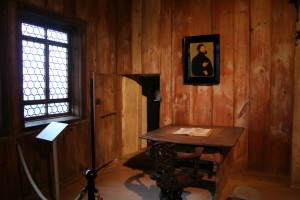
Today’s post is also my monthly column for the Episcopal News Service. You can read it here or below:
Martin Luther and I have had a long but somewhat contentious relationship. Growing up in a Lutheran church, I memorized much of his Lutheran catechism, attended Luther League as a teenager, knew all the verses to “A Mighty Fortress Is Our God,” and graduated from Luther College. But despite this immersion in Lutheranism I never quite warmed to the stern German, and when I became an Episcopalian I was relieved to leave old Martin behind.
So it surprised me when tears come to my eyes as I entered Luther’s Room in Wartburg Castle on a recent trip to Germany. I knew the history of what had happened in that simply furnished, plain room in 1521-22. It was here that Luther translated the New Testament into German while hiding from church authorities after the uproar ignited by his 95 Theses, written to protest the sale of papal indulgences.
The tears came, I think, because in that room I realized as never before the power of a single person of faith to change the world. Luther’s influence came not from political might or inherited privilege, but instead from his refusal to recant what he knew was right. When brought before a tribunal who demanded that he repudiate his writings, he refused, knowing that his audacity could result in his death. That refusal to recant led him to exile in Wartburg Castle, where he transformed himself from Roman Catholic monk to Protestant reformer.
It’s no accident that many of the most powerful writings in history were penned in prison or during exile, from the book of Revelation written on the island of Patmos to Martin Luther King, Jr.’s “Letter from the Birmingham Jail.” While authorities think that such forced isolation will silence and intimidate rebels, instead the experience can forge a deepened commitment to justice and a hardened resolve. Alone with their thoughts and with God, countless prisoners of conscience have found their cells to be a crucible that tempers and strengthens them.
For Luther, the isolation of that room gave him the opportunity to create a vernacular translation of the Bible, an undertaking with profound implications for the church and for the world. In that room I could feel the invisible presence of those who had been influenced by Luther’s witness, from generations of Protestant reformers to Johann Sebastian Bach, who tried to express in music what Luther penned in his theological writings.
The room was a reminder as well that a desk can be a kind of altar, a place where hearts and souls are offered for God’s use. We who labor in solitary professions like writing often feel that our efforts mean little in the frenetic rush of contemporary life, but Luther’s room reminds us that change is often triggered by the simple act of putting pen to paper.

And for all of us, Luther’s room can teach us the importance of time spent in solitude. Its starkness brings to mind the fourth-century wisdom of the Desert Father Abba Moses, who when asked for advice from one of his brothers, said this: “Go, sit in your cell, and your cell will teach you everything.”
Luther learned that lesson well, so much so that even today his influence still reverberates in unexpected places. When I was in Turkey recently, for example, I had a conversation with a tour guide about the state of Islam across the world. I was surprised when he offered the observation, “Islam needs a Martin Luther.”
He meant, I think, that Islam needs a fearless reformer who advocates for the importance of individual conscience and who is not afraid to speak against political authorities. The guide’s words proved to me once again the power of what had been unleashed by Luther, scribbling away in that cold and drafty room through a cold German winter. Five hundred years later, we are still learning from his example.











